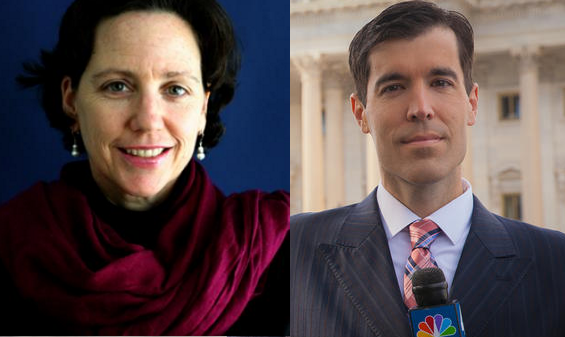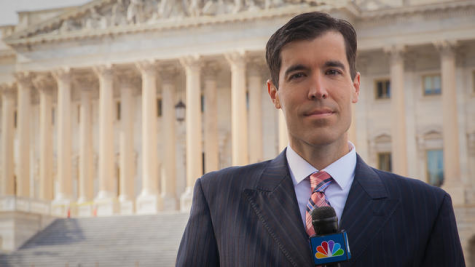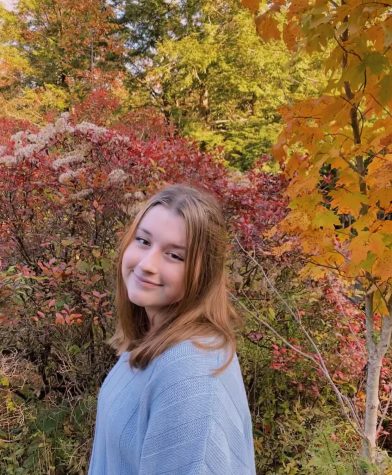Scott MacFarlane and Corinne Dufka share journalistic expertise

Photos courtesy of Human Rights Watch and NBC News4
Corinne Dufka and Scott MacFarlane served as guest speakers for RM’s journalism classes.
October 31, 2019
Since I enrolled in journalism at Richard Montgomery, one of my hopes for the class was that I would get to meet and learn from real journalists, not only about how to succeed, but also how to embrace the job with integrity and drive. Who better to teach young reporters than those who are already out there in the field? Last year, our class heard from many guest speakers, ranging from Washington Post writers to Board of Education members. When our teacher announced that we would be having guest speakers again this year, I jumped at the opportunity to attend their presentations.
This October, RM welcomed journalists Corinne Dufka and Scott MacFarlane, who visited the Intro to Journalism and Advanced Journalism classes, respectively. I attended their visits and interviewed them separately as well, and while I was nervous to have phone calls with professional journalists, I greatly appreciated the advice and information they shared with me. As with many interviews, the dialogues became less intimidating once I got out of my comfort zone as a high school reporter and really dug into the conversation.
Both journalists, who are exceptionally accomplished in their respective fields, gave detailed and interesting presentations. Dufka, who is the West Africa Director at Human Rights Watch and a former photojournalist for Reuters News Agency, visited the Advanced Journalism class on Tuesday, Oct. 15, and MacFarlane, who is an investigative reporter for the NBC News4 I-Team, visited the Intro to Journalism class on Tuesday, Oct. 22.

Corinne Dufka spoke to the Advanced Journalism class on Oct. 15.
At her current job, Dufka’s responsibilities entail tracking and reporting human rights violations in West African countries. She spoke to the class mainly about her time as a photojournalist, where she covered various major historical events across the world, such as the Rwandan Genocide, the Bosnian War, and the Somalia Famine, to name a few. “I always tried to focus my pictures on the civilian cost of armed conflicts,” Dufka said. “I hope that many of those pictures moved individuals and government a little bit closer to taking action that would bring about a rejection in the suffering.”
“If you’re thinking of covering a particular beat, you have to be really dedicated to studying and learning about that particular beat,” Dufka said. She shared an international scope of journalism that we as students don’t typically investigate. I am not familiar with the intricacies of photojournalism or human rights reporting, so learning about Dufka’s experiences provided a level of understanding well beyond just reading an article.
Other classmates were also impacted by Dufka’s work. “Not only was she writing about things, she actually had the experience of going to so many places around the world,” senior and Advanced Journalism student Kyra Wisneski said of Dufka’s visit. “It was really interesting to have such a worldly viewpoint presented to us.”
In contrast, MacFarlane’s work centers around local news and involves much quicker turnaround times. In addition, he appears on a live news broadcast every night on NBC News4. “I’ve had as much as ten months and I’ve had as little as ten minutes to do a story,” he said.
During his visit, MacFarlane ran the class through a few activities, such as how to write proper captions and prioritize what news to announce during a live broadcast. MacFarlane also highlighted the common challenge of addressing misinformation on television, which is an issue that live reporters have to handle daily.

Scott MacFarlane visited the Intro to Journalism class on Oct. 22.
“I often wondered how reporters correct themselves if they get information wrong, and he [MacFarlane] explained that in a very clear way which I appreciated,” senior and Intro to Journalism student Emma Sprague, who works on RMBC, RM’s morning announcement broadcast, said of MacFarlane’s visit. “Honestly, I would love to have more reporters coming to our school,” Sprague said.
Although I do not work on RMBC, and the idea of being in front of a camera is definitely nerve-wracking, I wholeheartedly enjoyed learning about the challenges of broadcast journalism from MacFarlane. Since I am the editor of the TidePod, the Tide’s student-made podcast, I could relate to some of the challenges MacFarlane illuminated, like accidentally saying the wrong name or information.
Not only did MacFarlane and Dufka talk about their jobs and life experiences, but they also talked about some of the vital aspects of strong journalism, including the responsibility of making the right ethical choices. “One of the challenging but also one of the fulfilling parts of journalism is that you have to wrestle with ethical decisions and you have to do right as often as you can,” MacFarlane said. “The most important part of your performance, the thing you’ll be judged on the most, is how well you treat other people during stressful situations.”
Journalists continuously judge what information must be presented to the public. They have to make subjective ethical decisions on the daily, but their reporting must remain objective. “Be aware of your internal biases, your personal biases,” Dufka said. “Make sure that your internal impartiality meter is on at all times in everything that you do, in every interview you do, in every picture you take, in every article you write, because ultimately our neutrality is our arm and our defense as journalists.” Objectivity is an issue that is becoming increasingly prominent in today’s media, and MacFarlane and Dufka are no strangers to it.
A final piece of advice from MacFarlane resonated with me: “The more writing you do, the better off you are,” MacFarlane said. “No matter what platform or field or type of journalism you’re in, it’s going to involve a high volume of writing.” I’ve never been one to easily adapt to change, especially when it comes to writing in different styles than my normal, but I’ve noticed that the more I write, the more comfortable I become as a writer — something that journalists like MacFarlane and Dufka have had years of experience doing.
MacFarlane’s and Dufka’s visits were highly informative, inspiring and timely, and my aspiration to hear from individuals with firsthand experience in the field went well beyond what I expected. Though the two have very different styles, they demonstrate that journalists can be objective and fair as well as passionate about their jobs and the issues they cover. For someone who hopes to pursue a future in journalism, being able to hear from and talk to these guests was an experience that I will take with me into college and beyond, and I’m sure my classmates will too.


